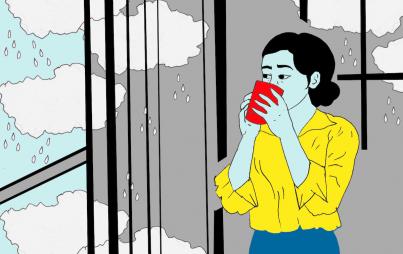
Credit: ThinkStock
I made a promise to myself a few months ago. A planner I am decidedly not, but I had one (at least abstract—which is generally all I can muster) plan I was going to stick to: Move to California and in the sunshine, with the support of coworkers, in a newfound space of solidarity, I would dig deep with my writing—deeper, much deeper with my writing. The plan was to get to the Bay Area and get real as fuck with my sentences, to string together as many honest words as I was fundamentally able to do.
I feel as though I have largely—if not completely—failed in this endeavor. But of course, no matter what I had been doing, I would feel this way. At the core of my issues is an oppressive perfectionism, a crippling sense that nothing I say or do will be good enough, will be worth much of anything at all.
This is one iteration of my demons. I can work to tame them, but they—and this debilitating self-denigrating voice—will be mine to battle forever.
This piece is me taking up the sword and stepping into combat. These words represent me claiming one of my current “failures” and redefining it as what it really is: a fundamental, physiological response to the world we live in.
Let me back up. Let me explain that my background is in international relations and foreign policy. It’s what I studied—both in the U.S. and the Middle East—and it used to be my work. For a multitude of reasons, both personal and ideological, I’ve abandoned this career. But I remain as invested as ever in global issues and ever more passionately with women’s issues. To that end, I devised a series last week surrounding the UN’s 16 Days of Activism Against Gender-Based Violence. I wrote a piece on its background. I reached out to organizations for them to weigh in on the work they’re doing to confront the global pandemic that is violence against women. Ever wonderful and supportive, my coworkers jumped in with their own contributions.
I was, as usual, ambitious. I wanted to cover all the topics that get devastatingly scant attention despite their wide-ranging and debilitating prevalence: sexual violence as a tool of war, domestic violence and female infanticide; how poverty and climate change disproportionately affects women; etc., etc. But the days passed and I couldn’t write.
I decided, in light of this inability, to zero in on the economic losses of gender-based violence—a facet that is rarely discussed: how we lose, literally, billions of dollars every year due to gender-based violence. And yes, this holds true even in the “developed” world. Maybe, I thought, since women’s narratives often aren’t enough, because men so often look to facts and figures for something to be real, to be believed, that by highlighting this facet it would help magnify this horrific epidemic.
But day after day, I still couldn’t write.
Sorry, I’d tell my generous, understanding coworkers, I’ll have this tomorrow. Super sorry, again, I'd say, offering up some excuse or another.
I was failing my plan. I was failing myself. I was failing my ability to work.
But I continued to feel the pressure to highlight this issue. More people have to know that a quarter of adult women in this country have been physically assaulted by a partner in their lives. People have to be made aware that interpersonal violence is the most common cause of injury for women ages 18 to 44. And that this, as a logical consequence, leads to an increased risk of chronic disease: heart disease (70% more), a stroke (80% more) and asthma (60% more).
There are a multitude of reasons to care about the issue of domestic violence, I thought—and think—but perhaps when people know the costs of intimate partner rape, physical assault and stalking exceed $5.8 billion each year in the good ol' U.S.A., that maybe more would be likely to care, to do something.
So much of what plagues our media and political climate is "you think YOU have it bad? In [insert name of country like India, Afghanistan, Saudi Arabia] women can’t even [insert ability to drive, vote, go to school]!" The message is loud and clear: Shut up. No one’s gang-raping you to death on a bus, you can vote, stop bitching.
Except that . . . our reproductive health rights are constantly being infringed upon within a political context dominated by men. And we are being gang raped and then widely attacked—even doxxed for trying to speak out about a heinous experience of sexual violence. One in four—or one in five (mere gradations of horror of an epidemic that continues to go ridiculed and unchecked)—of women have experienced or will experience a sexual assault or attempted sexual assault in their lifetime. In a similarly dire statistic, one in four women face domestic violence in this country. As outlined above, men present the biggest physical threat to women between the ages of 18 to 44.
This is the world we live in.
I have wanted to write about this. I wanted to tell the world, from my tiny little soap-box, that America loses $319 million per year to sexual assaults alone. And another $4.2 billion to physical assaults against women annually. Because maybe if our lived experiences of violence, discrimination and harassment don’t resonate, won’t be believed out of willful recalcitrance or ignorance to accept how bad it really is out here, just maybe numbers will speak for us. Maybe the sheer loss of capital—an estimated $8.3 billion in expenses annually between higher medical costs ($5.8 billion) and lost productivity ($2.5 billion)—in this struggling economic climate would mean something to someone who’d previously not acknowledged the breadth of our nation’s tremendous issues with gender-based violence.
But I couldn’t write. I couldn’t write because that thing was happening again. I’d been triggered by the magnitude of this violence and our current media climate and entered a dissociative state. I lacked energy, I felt like I was breathing through a straw. Jello felt like the medium of my world, that to move even the smallest amount would require far more energy than it should. Moving has been hard, eating has been hard. Feeling connected to my body has been hard. This is dissociation. It is a defensive mechanism my body uses—a means of protection. It’s a literal escape from my corporal being—because inhabiting my body means inhabiting a site of abuse, of trauma, of violation. So, in an act I have limited to no control over, my body decides to check out. And I'm rendered a blob.
It’s hard to type in this space. It’s hard to do anything in this space. The world seems gray and uninviting. Basic tasks overwhelm. Basic tasks like opening a laptop, basic tasks like writing.
With this basic task of writing, of course, constituting my job.
Between my vacillations of being a dissociative, paralyzed lump and bouts of sobbing, I’ve been unable to perform my professional duties.
I’ve wanted to write about violence against women. Both because it’s important and because I believe more people need to know, need to understand how real an issue it is. But I couldn’t do it because of the violence I’ve faced in my life . . . for being a woman. From in my home, at school, on the streets, in work environments, in other countries. At the hands of individuals, of partners, of mentors, of institutions, and indeed, society writ large—a society that largely rejects the pain of women. A society that doesn’t want to hear our narratives of abuse. That actively works to discredit, vilify and trivialize those of us who speak out about what we face. At times, like in recent days, this has overwhelmed and literally, against my will, paralyzed me.
And it wasn't even until today that it dawned on me: I am proving the point I initially sought to make through statistics. Violence against women costs us all a lot. There is the emotional toll. There is the physical toll. There is the overall health toll. And all of these tolls amount to a financial toll: I have been unable to do my very job.
Violence against women comes at many great costs.
And until we realize just how dear a price we are paying and do something to address it, each of us who’ve suffered will continue suffering, our mental health withering, our jobs reflecting our diminished capacities despite our best efforts to push ourselves to function.
I am a casualty, and I have been draining the system of its resources.
Poignantly, my 16 Days of Activism piece comes a day too late; the campaign ended yesterday. Then again, the idea that there are only 16 days of activism officially internationally devoted to this crippling—both on an individual and societal level—issue is laughable. Or would be if I were capable of such an act in my current state.
For once though, at least, I am being real about it all.






